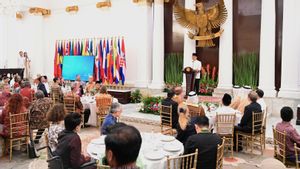JAKARTA - The badminton legend of ethnic Chinese descent Liem Swie King was born today, February 28, 64 years ago or 1956 in Kudus. His career skyrocketed amidst the negative sentiment of the majority of the majority who are native or native to the Chinese ethnicity. Lim Swie King recorded an achievement and brought the name of the Indonesian nation to perfume.
He debuted in the 70s. In that year, Indonesia was under the rule of the Soeharto regime or the new order (Orba). According to Irwanti Said, in his sociological review article published in the Journal of Social Welfare Mimbar (2019) explained, the discourse of ethnic Chinese and Indigenous conflicts was raised again during the Soeharto regime.
During the New Order era, there were discriminatory laws such as prohibiting the publication and printing of writings or advertisements discussing China through the Circular of the Director General of Press and Graphic Development of the Ministry of Information of the Republic of Indonesia No. 02 / SE / Ditjen-PPG / K / 1988. In addition, there is also a prohibition on the religions, beliefs and customs of China through Presidential Decree no. 14 in 1968.
Indeed, the negative sentiment towards ethnic Chinese has been going on since the time before independence. Quoting Hendri F. Isnaeni's writing in Historia, this sentiment has continued after independence, such as what happened in Tangerang in 1946, Bagan Siapi-api in September 1946, and Palembang in January 1947.
Racism against ethnic Chinese has been getting stronger since 1965 because the People's Republic of China is considered the main sponsor of the September 30, 1965 Movement. Since that event, everything that is Chinese has been eradicated. Meanwhile, various restrictions have been imposed, such as restrictions on entering universities, being in the army, being a civil servant, and so on.
Achievement King
Although sentiment towards the Chinese ethnic group is still volatile in society, Liem Swie King focuses on practicing badminton. He has been playing top badminton since childhood at the encouragement of his parents.
His passion for playing badminton was further honed when he joined the Djarum Badminton Association four years after the Gestapu or in 1969. There, King was known as an athlete who was diligent in training. "The upward trajectory in the Colo and Kaliyitno (Kudus) areas is a witness to King's persistence," notes the page pbdjarum.org.
The results of King's training bear sweet fruit. At the age of 17, he managed to start by winning the PON gold medal. Since then his name has become known to the national community. In 1973 he was then summoned to enter the national training camp (Pelatnas) at the end of 1973.
His name became increasingly famous internationally after he was able to challenge his idol Rudi Hartono in the All England final in 1976. Since then, his phenomenal career has skyrocketed. He was runner-up to the All England sequentially in 1976 and 1977.
His career continued to improve after that, Swie King became champion in 1978 and 1979. In addition, he made his own record to become "king of badminton" who was unbeaten for 33 months.
His expertise in swinging racket makes Liem Swie King nicknamed the king of smash. Still written by pbdjarum.org, Swie King does have a distinctive smash, namely hitting the ball hard while jumping.
His achievements in the badminton world are almost countless. In his song in the Thomas trophy, for example, he succeeded in bringing the trophy in 1976, 1979 and 1984 out of six times his participation in defending the red and white.
Swie King decided to retire from badminton after being active for 15 years. After hanging his racket, he did not continue his career in badminton like other athletes who chose to become coaches. This native Kudus athlete chose to become an entrepreneur.
King is not immune to discrimination
Swie King may be considered a hero because he has made Indonesia's name famous in the international arena. However, apparently this was not enough to ward off discrimination against ethnic Chinese, especially Swie King. Here's the story.
Citing the April 1, 2003 edition of Reformata, in March 2003 after reform, Swie King and members of the Indonesian Badminton Community led by Tan Joe Hoek met with Vice President Hamzah Haz to submit complaints about citizenship. Apart from Swie King and Joe Hoek there are also other badminton legends such as Hendrawan, Chandra Widjaya, and Icuk Sugiarto.
The Indonesian badminton heroes were forced to complain directly to the vice president because they had long experienced and endured discriminatory treatment in various matters relating to the administration of citizenship.
In various administrative matters of population, they must include a statement letter releasing citizenship of the People's Republic of China to remain an Indonesian citizen.
"They are big names who have contributed to the fragrance of the nation and state in the international community, but are still treated as second-class citizens in their own country," wrote Reformata.
Because of this nationality issue, they face difficulties starting from going to school to applying for work. They must include Proof of Citizenship of the Republic of Indonesia (SBKRI). In fact, it is enough to include a National Identity Card or birth recognition certificate.
The treatment experienced by the badminton heroes reflects that even those who have made the nation proud are not immune from discriminatory treatment. Even though at that time the Soeharto era had already ended.
The English, Chinese, Japanese, Arabic, and French versions are automatically generated by the AI. So there may still be inaccuracies in translating, please always see Indonesian as our main language. (system supported by DigitalSiber.id)













